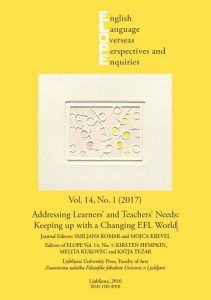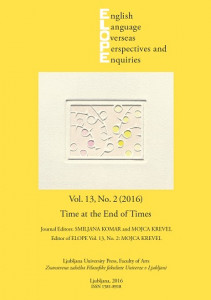Special Issue of ELOPE Vol. 14, No. 1 (2017): M@king It New In English Language Teaching
English Language Teaching is a dynamic, extensive and varied research discipline, underpinned by one fundamental question: how best to meet the needs of English learners, especially in our increasingly globalised and digitised world. This single question encompasses a host of related and inter-related issues. When we consider the language we teach, what do we mean precisely by English – should our learners attain EFL or ELF norms? Should that language be taught by a native or non-native speaker, assuming that these categorisations have any validity? How do we equip our learners for intercultural encounters? What kind of cultural or intercultural knowledge should we cultivate and how do we attain it in a classroom setting? To what extent should that classroom setting rely on technology such as smart phones or tablets? How should the most recent advances in research on second language acquisition be implemented by teachers? What do we know of our learners’ motivation, self-concept, or any other psychological concept, and how does that impact upon our teaching methods and strategies? And how should the needs of those who will pursue a career in English – our future teachers and translators – be addressed?
This special issue aims to bring together scholars, researchers and practitioners from all levels of the education system to report on and review the latest in English Language Teaching, as well as to explore potential future developments in the field.
Submissions are welcome from all subject areas of English Language Teaching, such as:
Teacher Training and Education;
Teaching English as a Second or Foreign Language;
Teaching Methodology;
Teaching Literatures in English;
Language Teaching and Translation;
Developments in the E-Classroom;
Psychology in Language Learning;
and other related fields.
A selection of papers will be published in the spring 2017 (Vol. 14, No. 1) special issue of ELOPE: English Language Overseas Perspectives and Enquiries, a double-blind, peer-reviewed academic journal that publishes original research articles, studies and essays addressing issues of English language, literature, teaching and translation. The volume will be edited by guest editors Melita Kukovec, Kirsten Hempkin and Katja Težak.
Papers of between 5000 and 8000 words in English should be submitted through the ELOPE online paper submission system. To ensure a blind review, the submitted file should not contain the author’s name or other personal data. For formatting and documentation, please see the sample paper in the attachment and Author Guidelines on the ELOPE website.
The submission deadline is 10 January 2017.



